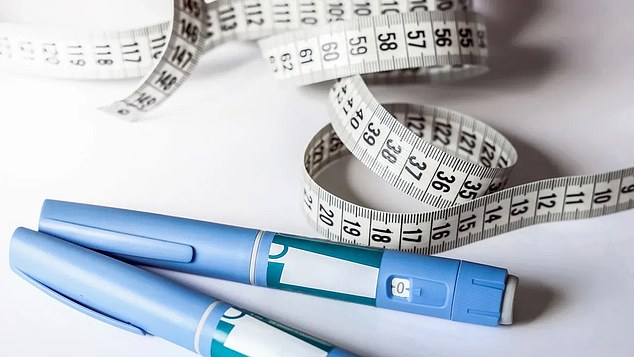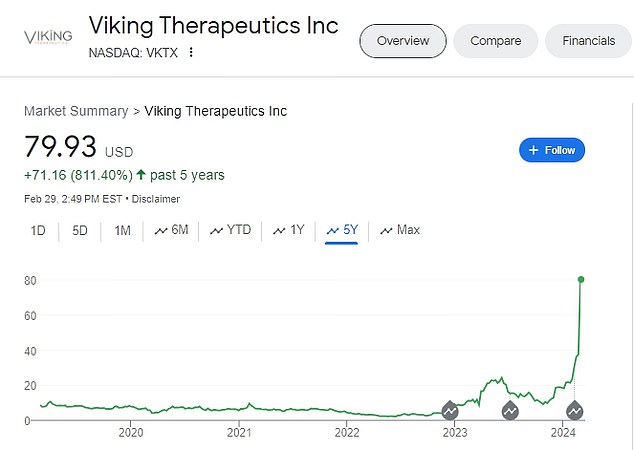An experimental weight loss drug could burn fat up to five times faster than the drug behind Ozempic and Wegovy, trial results suggest.
Obese and overweight patients put on the new once-weekly injection lost up to 32lbs, or 14.7 percent of their bodyweight, on average in just 13 weeks.
For comparison, clinical trials of the drug in Ozempic and Wegovy found patients only lost this much weight in 68 weeks — or five times as long.
The California-based biotech company which makes the drug, Viking Pharmaceuticals, saw its shares double in value after the results were revealed, giving it a stock-market value of $8.5 billion. The company’s share price has more than quadrupled so far this year.

Doses of the experimental drug were administered at up to 15 milligrams (mg) per week, much higher than the regimen for other weight loss drugs (stock image)

Viking’s share price has more than doubled since the announcement. Shown above is the company’s share price value over the last five years
Viking reported that patients in its trial had adverse events such as nausea and vomiting but said the cases were mild or moderate.
This was similar to trials of Ozempic and Wegovy, where patients also reported these side effects.
One patient in the trial for the drug — named VK2735 — had a severe case of dehydration.
Ozempic, Wegovy and Eli Lilly’s tirzepatide work by stimulating naturally occurring hormones that regulate blood sugar and suppress appetite.
Viking’s drug act on two receptors like tirzepatide — but the Phase Two trial suggested its injection was even more effective than the latter.
However, Vikings will still need to go through Phase Three trials — to assess its safety and effectiveness in a larger population — before confirming that success.
After Phase Three, it will also become eligible for approval from the Food and Drug Administration (FDA). The company said it is currently in talks with the agency.
A price for the new medication has not been revealed, but Ozempic costs upward of $900 per month out-of-pocket.
Viking still needs to find a distribution partner to mass produce the drug.
The development comes as pharmaceutical companies try to cash in on the US weight loss drugs market, which is expected to surge to $44billion by 2030 from less than $100million in 2020.
More than nine million prescriptions were written for drugs including Ozempic, Wegovy and Mounjaro in the last three months of 2022, with companies racing to expand supply to meet the demand.
Viking Pharmaceuticals says their drug works by mimicking the hormone Glucago-like peptide-1 (GLP-1), the same as in Ozempic that makes patients feel full for longer.
But the drug also mimics glucose-dependent insulinotropic polypeptide (GIP), which can help to slow the movement of food through the gut — ensuring someone feels full for longer.
In Viking’s study, scientists recruited 176 adults who were obese or overweight with at least one underlying co-morbidity such as type 2 diabetes.
They weighed 225lbs on average at the start of the study.
The participants were initially split into five groups of about 35 adults each, with one being the placebo while the other four were randomized to doses of VK2735 ranging from 2.5 to 15mg.
Scientists then monitored their weight over the course of 13 weeks while they received weekly injections of the drugs, as well as any reported side effects.
The trial was double-blind, with neither scientists nor participants being told who was receiving the new drug and in what dose.
Results showed that 88 percent of patients in the group receiving the highest dose achieved a weight loss of at least 10 percent of their initial bodyweight.
People in this group lost 32.2lbs over the study period on average, equivalent to 2.5lbs per week.
For comparison, the smallest amount of weight loss was recorded in the group that got 2.5mg per week — at 20lbs over the study on average or 1.5lbs per week on average.
In the placebo group, only four percent had a weight loss at this level over the same period.
Patients in the highest dose group were also most likely to report side effects — with 40 percent saying they had nausea and 30 percent saying they suffered from vomiting.
For comparison, those who got the lowest doses were least likely to experience side effects with nine percent saying they suffered from vomiting.
It was not clear what proportion of the weight lost was fat compared to muscle, with the issue in previous trials being that patients had mostly lost muscle — which led to them quickly regaining the weight when they returned to their old diet.
Revealing the results, Dr Brian Lian — Viking’s chief executive officer — said: ‘We are excited to report the topline results from this important Phase Two study.
A total of 18 out of 176 patients — or 10 percent — also discontinued treatment while they were in the study.
‘VK2735 continues to demonstrate a promising efficacy and tolerability profile following 13 weeks of repeat dosing in obese subjects.’
He added: ‘Notably, robust weight loss compared with placebo was observed early across all doses evaluated in the VENTURE study [Phase Two trial], and continued throughout the treatment period in all treatment groups.
‘No evidence of a plateau at week 13 was observed for any VK2735 dose, suggesting further weight loss might be achieved from extended dosing periods.
‘We look forward to progressing this important therapy into further clinical development later this year.’
The company is also working on an oral formulation of their drug, similar to that being developed by Ozempic’s manufacturer Novo Nordisk.









